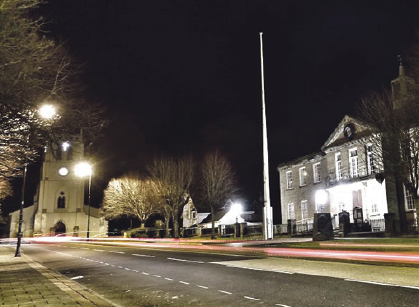News
Hospital records blunder did not cause death


Inquest: Milford Haven Town Hall • Pic: Gareth Thomas
AN INQUEST into the death of 49-year-old Peter Francis Jones from Holloway in Haverfordwest was held at the Coroner’s Court in Milford Haven on Tuesday (Feb 2).
Acting Coroner’s Officer Gareth Warlow said that Mr Jones had never been married, but had one son.
The deceased had attended Milford Haven Central School and went on to work in electrical shops for the majority of his life. Before he opened his own business – Connect Appliance Repairs in Haverfordwest – in 1995, Mr Jones was a heavy drinker. The opening of his shop however saw his issue with alcohol come to a halt.
As Mr Jones got older, his health deteriorated and problems with his spine meant that he was in and out of hospital and prescribed Morphine.
In the last few months of his life, Mr Jones’ family and friends noticed that his stomach began to swell.
On May 15, 2015, Mr Jones collapsed while in Haverfordwest and was taken to Withybush Hospital. He had consumed a large amount of alcohol, he had vomited and he was unresponsive.
As there were no beds available at Withybush, so Mr Jones was transferred to Prince Philip Hospital in Llanelli. He was then transferred back to Withybush some days later.
Discharged on May 22, Mr Jones was told that he would receive a letter to attend an ultra-sound appointment to diagnose the swelling of his stomach. Due to the fact he was unhappy with his treatment, Mr Jones put in a letter of complaint to the hospital.
On May 26, Mr Jones went to see his doctor because he was concerned about his swollen stomach. He was told to change his lifestyle and to wait for the ultra-sound appointment. The doctor also prescribed Mr Jones anti-depressants and gave him pain relief.
That evening, Mr Jones went to bed as normal with his close friend, whom he was staying with. When she woke at 6am, she noticed that Mr Jones’ breathing was raspy, before it became erratic. She checked his pupils to find that they were very small and therefore called the emergency services.
Mr Jones was taken to A&E, where his health deteriorated, and he was pronounced dead at 7.10am on Wednesday, May 27.
Mr Jones’ mother, Margaret Jones, spoke at the inquest. She discussed the fact that she was unhappy that her son arrived at Prince Philip Hospital with no medical papers, so doctors were only able to deal with the situation based on what they were told and what was before them.
Mrs Jones also handed pictures over to the coroner to highlight her son’s swelling.
Daniel Hauser, who conducted a postmortem of Mr Jones’ body on May 28, spoke at the Coroner’s Court.
Mr Hauser said that Mr Jones was “very healthy person for his age.” He said that there were no major concerns while he conducted the external exam and commented that there were no signs of swelling.
He added that there was nothing out of the ordinary inside Mr Jones’ body as his body was in “very good condition” with “no major findings.”
Mr Hauser then read out a toxicology report, which highlighted the presence of Morphine and Diazepam.
He read that the level of morphine was of a concentration which had caused death in past cases and said the combination with Diazepam could have contributed to his death.
He said: “The postmortem revealed no obvious cause of death I would be happy to give as a cause of death, but the statement of the toxicology report reads that the level of Morphine has been associated with fatality. I believe it was the combined effect of drugs which caused his death.”
Coroner Gareth Lewis came to the conclusion that Mr Jones’ death was drug related and stated that while his parents were rightly concerned about his swelling, it did not cause his death.
Charity
Vincent Davies raises £13,682 for air ambulance charity

Independent Haverfordwest store backs lifesaving crews with year of community fundraising
A WEST WALES department store has raised more than thirteen thousand pounds for a lifesaving emergency service after a packed year of community fundraising.
Staff at Vincent Davies Department Store collected £13,682 for the Wales Air Ambulance Charity, after voting the organisation their Charity of the Year for 2025.
The independent retailer organised events throughout the year, including an Easter bingo, bake sales, quizzes, raffles, staff sales, Christmas jumper days and a festive wreath-making workshop. Charity jam jars placed in Café Vincent also helped gather steady donations from customers.
One of the most popular attractions was the store’s charity singing penguin trio, which drew smiles from shoppers of all ages and boosted collections.
Sarah John, Joint Managing Director at Vincent Davies, said: “Raising £13,682 for the Wales Air Ambulance Charity is something we are extremely proud of at Vincent Davies Department Store. As a director, it’s wonderful to see our community come together to support a charity that makes such a lifesaving difference.”
The air ambulance is consultant-led, delivering hospital-level treatment directly at the scene of serious incidents and, when needed, transferring patients straight to the most appropriate specialist hospital.
Working in partnership with the NHS through the Emergency Medical Retrieval and Transfer Service, crews can provide advanced critical care including anaesthesia, blood transfusions and even minor surgical procedures before reaching hospital.
Operating across the whole of Wales, its teams travel the length and breadth of the country by helicopter and rapid response vehicle to reach patients quickly in both rural and urban areas.
This is not the first time the Haverfordwest store has backed the cause. In 2016, staff previously raised £5,831 when the charity was also chosen as their beneficiary.
Mike May, the charity’s West Wales Regional Fundraising Manager, said: “We are so grateful to Vincent Davies Department Store for raising an incredible amount for our charity. Throughout the year they put on a variety of different events and what a successful fundraising year it was.
“The charity needs to raise £13 million every year to keep our helicopters in the air and our rapid response vehicles on the road. By raising £13,682, the staff and customers have played an important part in saving lives across Wales.”
The store says it will announce its Charity of the Year for 2026 in the coming weeks.
Crime
Police assess complaints over Mandelson–Epstein links

Met says allegations will be reviewed to see if criminal threshold is met following release of US court files
SCOTLAND YARD is reviewing a series of complaints alleging possible misconduct in public office after fresh claims emerged linking former UK ambassador Peter Mandelson to convicted sex offender Jeffrey Epstein.
The Metropolitan Police Service confirmed it has received “a number of reports” following the publication of millions of pages of material by the United States Department of Justice, and will now decide whether any alleged conduct reaches the level required for a criminal investigation.
Commander Ella Marriott said the force would assess each report individually, stressing that a review does not automatically lead to formal proceedings.
The documents, widely referred to as the “Epstein files”, appear to show Mandelson corresponding with Epstein while serving as business secretary during the government of Gordon Brown at the height of the global financial crisis.
According to reports, Epstein was allegedly given insight into internal policy discussions, including proposals around banker bonus taxes in 2009 and details of a eurozone bailout package shortly before it was announced publicly.
Payments questioned
Bank records cited in the US disclosure reportedly show payments totalling 75,000 US dollars made to Mandelson between 2003 and 2004. It is also claimed Epstein paid for an osteopathy course for Mandelson’s husband.
Mandelson has denied any wrongdoing and said he has “no record or recollection” of the alleged transfers.
On Sunday he resigned his membership of the Labour Party, saying he did not want his continued association to cause further difficulty for the party.
In interviews, he dismissed suggestions that Epstein influenced his decisions as a minister and said nothing in the released files pointed to criminality or misconduct on his part.
Pressure mounts
The political fallout has intensified, with Downing Street confirming Keir Starmer has asked Cabinet Secretary Chris Wormald to carry out an urgent review into Mandelson’s historic contacts with Epstein while in office.
Brown has also called for an examination of whether any confidential or market-sensitive information was improperly shared during the financial crisis.
The case is the latest in a series of controversies linked to Epstein’s long-standing relationships with powerful figures on both sides of the Atlantic.
Police emphasised that no charges have been brought and that Mandelson is not currently under criminal investigation, but said the complaints process would be handled “thoroughly and impartially”.
Community
Councillor meets chief constable to address Monkton and Pembroke concerns

COUNTY COUNCILLOR Jonathan Grimes has met with the new Chief Constable of Dyfed-Powys Police to discuss crime, antisocial behaviour and wider community issues affecting residents in Pembroke and Monkton.
Cllr Grimes, who represents Pembroke St Mary South and Monkton, said the meeting followed his invitation for senior police leaders to visit the area and hear first-hand about local concerns.
The Chief Constable, Ifan Charles, attended alongside officers from the Pembroke Neighbourhood Policing and Protection Team, meeting the councillor in Monkton for what were described as open and constructive talks.
As part of the visit, they also spoke with Monkton Priory Community Primary School headteacher Dylan Lawrence and Danny Nash from Pembrokeshire County Council Housing Services to gather views from education and housing professionals.
Discussions covered a range of issues raised by residents, including domestic abuse, drug and alcohol misuse, antisocial behaviour and environmental concerns such as littering, dog fouling and dangerous or inconsiderate driving.
Cllr Grimes acknowledged recent police successes, particularly in tackling drug-related activity, but said enforcement alone would not solve the area’s challenges.
He said closer cooperation between the police, council services, schools and the wider community would be needed to deliver longer-term improvements.
The councillor added that he plans to encourage residents to form a local community group in the coming weeks, aimed at developing practical solutions and strengthening partnership working across the area.
-

 Health5 days ago
Health5 days agoConsultation reveals lack of public trust in health board
-

 News6 days ago
News6 days agoCaldey still unsafe, survivors warn — despite Abbey’s reform claims
-

 Community5 days ago
Community5 days agoPembrokeshire students speak at national Holocaust Memorial Day event
-

 News6 days ago
News6 days agoKurtz raises Gumfreston flooding in the Senedd as petition deadline nears
-

 Community7 days ago
Community7 days agoStorm Chandra: Morning impacts across Pembrokeshire
-

 Entertainment7 days ago
Entertainment7 days agoRapunzel brings festive magic to Torch Theatre
-

 Crime7 days ago
Crime7 days agoMan denies murdering brother as jury hears of ‘ferocious attack’ at Morriston flat
-

 Crime3 days ago
Crime3 days agoPembroke man accused of child sex offences sent to Swansea Crown Court

























